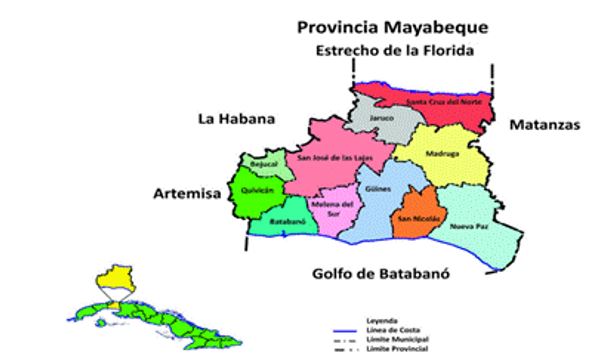Digital Transformation of the Agri-Food Sector in Cuba
Main Article Content
Abstract
The project aims to contribute to the national policy to improve national food production, and therefore food security, through the development of a training program in digital skills that allows reducing technical barriers; through which vulnerable groups benefit from the experiences derived from academic expertise, contributing to the development of an economically, socially and environmentally sustainable agri-food sector, making it a more attractive space that generates quality and inclusive jobs.To meet the objectives, a Training Program supported on the Moodle platform is launched for farmers in the province. This contribution becomes relevant and is aligned with the country's priorities, by proposing from an articulating approach, the strengthening of local capacities that contributes to innovation and management, on the principles of integrality, sustainability and social inclusion, to impact on the food safety. In the theoretical and practical foundation, the following problem is posed to be solved, how to improve the resilience of food production systems and promote the sustainable use of natural resources in the Cuban productive sector. The specific objectives are to identify technological opportunities and training needs in digital skills through a diagnosis; Design a training course in digital skills for an ecosystem of data from IoT sensors, Geopositioning Systems, Drones and Virtual Assistants (Chatbots) and implement the training of trainers in these skills promoting food security and sovereignty.
Article Details

This work is licensed under a Creative Commons Attribution-NonCommercial 4.0 International License.
Aquellos autores/as que tengan publicaciones con esta revista, aceptan los términos siguientes:
- Los autores/as conservarán sus derechos de autor y garantizarán a la revista el derecho de primera publicación de su obra, el cuál estará simultáneamente sujeto a la Licencia de reconocimiento-no comercial de Creative Commons 4.0 que permite a terceros compartir la obra siempre que se indique su autor y su primera publicación esta revista. Bajo esta licencia el autor será libre de:
- Compartir — copiar y redistribuir el material en cualquier medio o formato
- Adaptar — remezclar, transformar y crear a partir del material
- El licenciador no puede revocar estas libertades mientras cumpla con los términos de la licencia
Bajo las siguientes condiciones:
- Reconocimiento — Debe reconocer adecuadamente la autoría, proporcionar un enlace a la licencia e indicar si se han realizado cambios. Puede hacerlo de cualquier manera razonable, pero no de una manera que sugiera que tiene el apoyo del licenciador o lo recibe por el uso que hace.
- NoComercial — No puede utilizar el material para una finalidad comercial.
- No hay restricciones adicionales — No puede aplicar términos legales o medidas tecnológicas que legalmente restrinjan realizar aquello que la licencia permite.
- Los autores/as podrán adoptar otros acuerdos de licencia no exclusiva de distribución de la versión de la obra publicada (p. ej.: depositarla en un archivo telemático institucional o publicarla en un volumen monográfico) siempre que se indique la publicación inicial en esta revista.
- Se permite y recomienda a los autores/as difundir su obra a través de Internet (p. ej.: en archivos telemáticos institucionales o en su página web) antes y durante el proceso de envío, lo cual puede producir intercambios interesantes y aumentar las citas de la obra publicada. (Véase El efecto del acceso abierto).
References
Cóndor-Herrera, O. (2020). Educar en tiempos de COVID-19. CienciAmérica, 9(2), 31-37.
Delgado, T., & Capote, J. L. (2009). Semántica espacial y descubrimiento de conocimiento para el desarrollo sostenible [Proyecto CYTED-IDEDES. Evaluación y potenciación de las Infraestructuras de Datos Espaciales para el desarrollo sostenible en América Latina y el Caribe]. Universidad Tecnológica de La Habana-CUJAE, La Habana, Cuba.
Gómez, M. G., De los Ángeles, M., Stratta, A. E., Mendoza, B. A., & Zingaretti, L. (2020). La educación superior en tiempos de Covid-19: Análisis comparativo México-Argentina. Revista de Investigación en Gestión Industrial, Ambiental, Seguridad y Salud en el Trabajo-GISST, 2(2).
Herrera, C. O. (2020). Educar en tiempos de COVID-19. CienciAmérica: Revista de divulgación científica de la Universidad Tecnológica Indoamérica, 9(2), 31-37.
MINSAP-Cuba. (2020). Intervención del ministro de Salud Pública en la Asamblea Nacional del Poder Popular sobre los aportes de la ciencia en el enfrentamiento a la COVID-19 [Sitio de gobierno del Ministerio de Salud Pública en Cuba oficial]. Ministerio de Salud Pública en Cuba, La Habana, Cuba. https://salud.msp.gob.cu/intervencion-del-ministro-de-salud- publica-sobre-los-aportes-de-la-ciencia-en-el-enfrentamiento-a-la-covid-19
PCC-Cuba. (2011). Resolución del VI Congreso del PCC. Lineamientos de la política económica y social del Partido y la Revolución. Partido Comunista de Cuba, La Habana, Cuba.
PCC-Cuba. (2016). Actualización de los Lineamientos de la Política Económica y Social del Partido y la Revolución para el período 2016-2021. Editora Política del Partido Comunista de Cuba, La Habana, Cuba.
PCC-Cuba. (2020). Lineamientos de la política económica y social. Plan Nacional de desarrollo económico y social hasta 2030. https://www.pcc.cu/sites/default/files/documentos/2020-07/lineamientos-politica-partido-cuba.pdf. https://www.presidencia.gob.cu/es/gobierno/plan-nacional-de-desarrollo-economico-y-social-hasta-el-2030/institucionalidad-y-macroeconomia/ La Habana, Cuba.
Picón, G. A., González de Caballero, G., & Sánchez, P. J. N. (2021). Desempeño y formación docente en competencias digitales en clases no presenciales durante la pandemia COVID-19. ARANDU UTIC, 8(1), 139-153, Publisher: Universidad Tecnológica Intercontinental.
Rodríguez-Garrido, L. (2021). La Educación a distancia ante la crisis sanitaria del COVID-19, La Habana, Cuba.
Rodríguez-Delgado, O. (2021). Fortalecimiento de la autogestión comunitaria para el desarrollo territorial. Experiencia desde la Educación Superior. https://desarrolloyterritorio.unvm.edu.ar/ojs/index.php/desarrolloyterritorio/article/view/571
Suárez-Monzón, N. (2020). Formación docente universitaria y crisis sanitaria COVID-19. CienciAmérica: Revista de divulgación científica de la Universidad Tecnológica Indoamérica, 9(2), 109-114, Publisher: Universidad Tecnológica Indoamérica (UTI).
Tala, A., & Vásquez, E. (2020). Conexión en tiempos de COVID-19. Revista médica de Chile, 148(4), 557-558.
Tang, Y. M., Chen, P. C., Law, K. M. Y., Wu, C. H., Lau, Y., Guan, J., He, D., & Ho, G. T. (2021). Comparative analysis of Student’s live online learning readiness during the coronavirus (COVID-19) pandemic in the higher education sector. Computers & education, 168, 104-211. Publisher: Elsevier.
UNESCO-IESALC. (2020). Coronavirus COVID-19 and Higher Education: Impact and Recommendations. IESALC. UNESCO. https://www.iesalc.unesco.org/en/2020/03/09/coronavirus-covid-19-and-higher-education-impact-and-recommendations/site:iesalc.unesco.org
